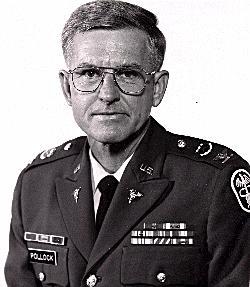

BA, Murray State Univ., Murray, KY, 1959
MHA, Baylor Univ., Waco, TX, 1970
Ph.D., Texas A&M Univ., College Station, TX, 1989
Army War College
President, Nashville Christian School, Nashville, TN, 1992 to present
Superintendent, Christian Heritage School, San Antonio, TX, 1989-92
Dean, Medical Field Service School, Academy of Health Sciences, Ft. Sam Houston, TX
1984-86
Dir., Directorate Spt., Academy of Health Sciences, Ft. Sam Houston, TX, 1984
Commander, Academy Bde., Academy of Health Sciences, Ft. Sam Houston, TX, 1982-84
Dir., Trng. Dev., Academy of Health Sciences, Ft. Sam Houston, TX, 1979-81
Commander, 47th Field Hosp., Ft. Sill, OK
Faculty, Mil. Sci. Div., Medical Field Service School, Ft. Sam Houston, TX
Resident, Martin ACH, Ft. Benning, GA, 1969-70
While in the program, I was influenced by Colonel Don Callaghan, Colonel Dick Harder, Colonel Tom Wood, Colonel John Kelly, and Colonel Jerry Allgood and the other members of the faculty.
Jim Kestner, Jim Downey, and I did our administrative residency at Martin Army Hospital, Fort Benning under the preceptorship of Colonel Jim Snelling. Jim Kestner and Jim Downey are both deceased, but I have so many fond memories of them. They were great friends. Jim Snelling is also deceased. Due to back surgery, I remained at MAH following the residency and Jim Snelling allowed me the opportunity to gain some extremely valuable experience as his assistant.
Once cleared medically, I was assigned to MACV as a medical advisor. Following that assignment I attended CGSC and then was assigned as a faculty member in the Military Science Division at the Medical Field Service School. While there, I worked very closely with the HCA staff and faculty. My next assignment was as the commander of the 47th Field Hospital at Fort Sill where I worked very closely with the staff at Reynolds Army Community Hospital. Then it was back to the Academy of Health Sciences for a stint as a training developer. During that time I was selected for Colonel and attendance at the Army War College. After the War College I was selected as the Commander, Academy Brigade, AHS. Following that I was the Director of Support, AHS, and then Dean, Medical Field Service School, the position I held upon retirement.
I attended Texas A&M University from 1986-1989 where I received the Doctor of Philosophy degree. In 1989, I became the superintendent of Christian Heritage Schools in San Antonio. In 1992, I moved to Nashville, Tennessee having accepted the position of president, Nashville Christian School, the position I now hold.
Looking back on my military and civilian careers since the U.S. Army-Baylor Program in Health Care Administration it is easy to see the great influence the program had on me. It gave me the tools, the skills, and the confidence to take on any job knowing that I had been well prepared to deal with the day to day situations involving the three M's of men, money, and material.
I have nothing but great memories of my time as a student and resident. Our class was a great collection of men and women who I believe made a significant contribution to military medicine as have all of the classes.
As someone whose career was somewhat different than the norm following the HCA program, I strongly recommend that a few field medicine (Mil. Sci.) types continue to be admitted to the program. I believe that it is not only good for the Army Medical Department, but it is also good for the program. I was and continue to be a supporter of the program and owe much of whatever success I have had both in the Army and now as a civilian educator to the lessons I learned while a student in HCA.